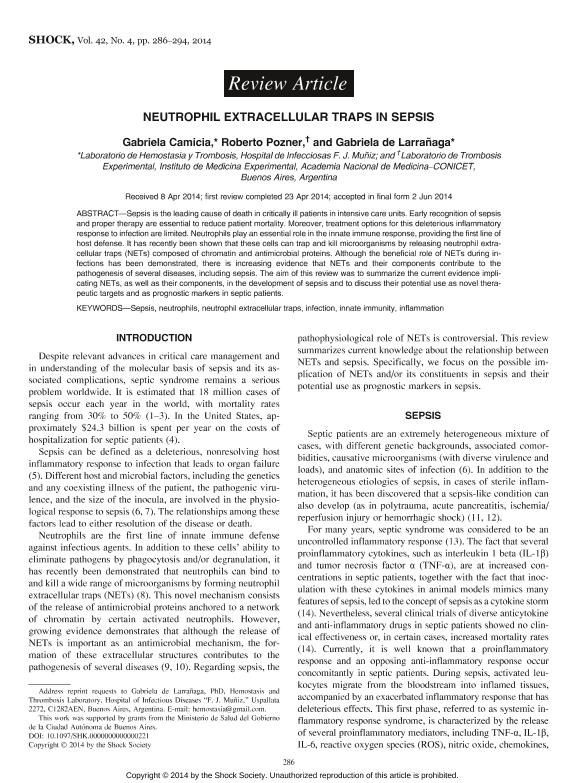Mostrar el registro sencillo del ítem
dc.contributor.author
Camicia, Gabriela Lorena

dc.contributor.author
Pozner, Roberto Gabriel

dc.contributor.author
de Larrañaga, Gabriela Fernanda

dc.date.available
2020-04-13T16:22:20Z
dc.date.issued
2014-10
dc.identifier.citation
Camicia, Gabriela Lorena; Pozner, Roberto Gabriel; de Larrañaga, Gabriela Fernanda; Neutrophil extracelular traps in sepsis; Lippincott Williams; Shock; 42; 4; 10-2014; 286-294
dc.identifier.issn
1073-2322
dc.identifier.uri
http://hdl.handle.net/11336/102384
dc.description.abstract
Sepsis is the leading cause of death in critically ill patients in intensive care units. Early recognition of sepsis and proper therapy are essential to reduce patient mortality. Moreover, treatment options for this deleterious inflammatory response to infection are limited. Neutrophils play an essential role in the innate immune response, providing the first line of host defense. It has recently been shown that these cells can trap and kill microorganisms by releasing neutrophil extracellular traps (NETs) composed of chromatin and antimicrobial proteins. Although the beneficial role of NETs during infections has been demonstrated, there is increasing evidence that NETs and their components contribute to the pathogenesis of several diseases, including sepsis. The aim of this review was to summarize the current evidence implicating NETs, as well as their components, in the development of sepsis and to discuss their potential use as novel therapeutic targets and as prognostic markers in septic patients.
dc.format
application/pdf
dc.language.iso
eng
dc.publisher
Lippincott Williams

dc.rights
info:eu-repo/semantics/openAccess
dc.rights.uri
https://creativecommons.org/licenses/by-nc-sa/2.5/ar/
dc.subject
SEPSIS
dc.subject
NEUTROPHILS
dc.subject
NEUTROPHIL EXTRACELLULAR TRAPS
dc.subject
INFECTION
dc.subject.classification
Medicina Critica y de Emergencia

dc.subject.classification
Medicina Clínica

dc.subject.classification
CIENCIAS MÉDICAS Y DE LA SALUD

dc.title
Neutrophil extracelular traps in sepsis
dc.type
info:eu-repo/semantics/article
dc.type
info:ar-repo/semantics/artículo
dc.type
info:eu-repo/semantics/publishedVersion
dc.date.updated
2020-04-08T13:13:05Z
dc.journal.volume
42
dc.journal.number
4
dc.journal.pagination
286-294
dc.journal.pais
Estados Unidos

dc.journal.ciudad
Philadelphia
dc.description.fil
Fil: Camicia, Gabriela Lorena. Consejo Nacional de Investigaciones Científicas y Técnicas; Argentina. Gobierno de la Ciudad de Buenos Aires. Hospital de Infecciosas "Dr. Francisco Javier Muñiz"; Argentina
dc.description.fil
Fil: Pozner, Roberto Gabriel. Consejo Nacional de Investigaciones Científicas y Técnicas. Instituto de Medicina Experimental. Academia Nacional de Medicina de Buenos Aires. Instituto de Medicina Experimental; Argentina
dc.description.fil
Fil: de Larrañaga, Gabriela Fernanda. Consejo Nacional de Investigaciones Científicas y Técnicas; Argentina. Gobierno de la Ciudad de Buenos Aires. Hospital de Infecciosas "Dr. Francisco Javier Muñiz"; Argentina
dc.journal.title
Shock

dc.relation.alternativeid
info:eu-repo/semantics/altIdentifier/doi/http://dx.doi.org/10.1097/SHK.0000000000000221
dc.relation.alternativeid
info:eu-repo/semantics/altIdentifier/url/https://insights.ovid.com/article/00024382-201410000-00002
Archivos asociados
